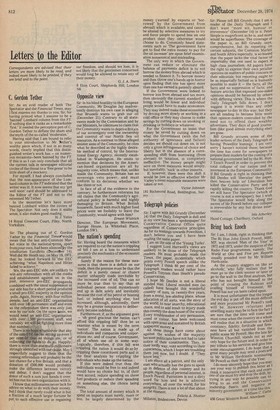The nation's spending
Sir: Having heard the measures which are required to cut the nation's crippling oil bill I am at a loss to understand precisely the mechanics of the economic situation.
Surely if the reason for these measures is that there is a deficit on our trade, then the premise must be that the deficit is a purely casual or chance matter unhappily made inevitable by the increased cost of Oil. This can no more be true than to say that an individual person could mysteriously end up in debt solely and inevitably because the cost of his petrol or heating fuel, or indeed anything else, had increased; although, admittedly, there may be a greater temptation to deliberately become indebted.
Furthermore, if, as the argument goes — 'oh good gracious the nation can't afford this crippling bill' then let us examine what is meant by the term 'nation'. The nation is made up of individuals and companies and corporations etc, and of course, Government, all of whom use oil in some way. Logically, therefore, if this bill was crippling the nation it would do so by crippling these constituent parts and in the final analysis by crippling the individuals who make up the nation .
If this were indeed true then the individuals would be free to and indeed would have no choice but to, of their own accord, reduce spending on these fuel products or reduce their spending on sornething else, the choice being theirs.
The total amount of money which is spent on imports must surely, more or less, be largely determined by the
money cearned. by exports or 'borrowed' by the Government from abroad) which is available, and cannot be altered by selective measures to try and force people to spend less on one product than they otherwise would choose to do. Commonly heard statements such as 'The government have got to find the extra money to pay for the oil increase' are upon brief examination nonsensical and misleading.
The only way in which the Government can reduce or eliminate the balance of payments deficit is to not borrow the money from abroad which is needed to finance it. To borrow money and then throw one's hands up in horror upon finding that one has spent more than one has earned is patently absurd.
If the Government were indeed to borrow less from abroad and tax more, then obviously the current standard of living would be lower and individual people would have to make economies. They may indeed make these economies by driving more slowly or working in a cold office or they may choose to make savings by cutting down on smoking or drinking or holidays or whatever.
For the Government to insist that money be saved by cutting down on what the Government (with the full authority of ignorance and failure) decides we should cut down on, is not only a gross infringement of choice and liberty but in the absence of a corresponding shift from borrowing (from abroad) to taxation, is completely ineffective. The money people might save on these measures would simply, but inevitably, 'suck' in other imports.
If, however, there were this shift it would be just as effective whether Mr Varley's mean miserable measures were taken or not.
Victor Johnson 181 Richmond Road, Beddington, Surrey.














































 Previous page
Previous page